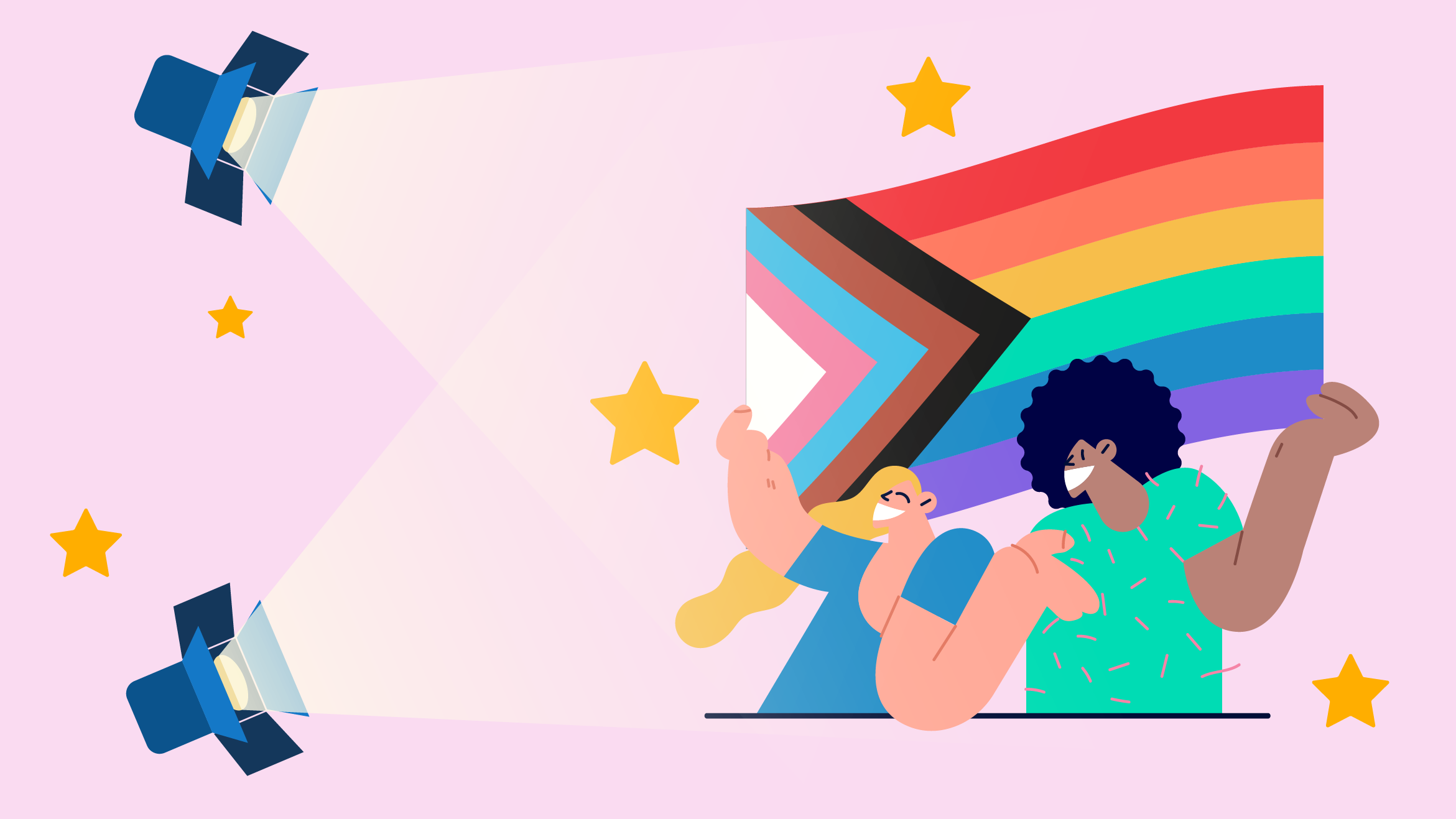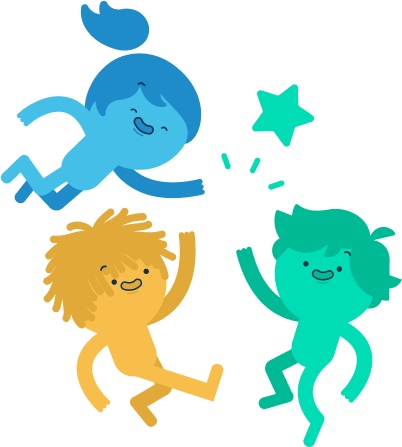True story: I recently saw an elderly man with his dog at my local shop. I love dogs, so obviously I went to tell him (the dog) he was the goodest boi. I ended up talking with this man for a little bit about random things, and to cut a long story short, someone else was talking about a man wearing a skirt (or something to that effect). This elderly man then said something like, ‘Oh, he must’ve been gay’ and ‘gay … this sickness’. This conversation happened in German, and I’m not fluent in the language, but I’m 99.9% sure he was spewing some severe homophobia. Now I could write this off as a ‘well, he is old and belongs to an entirely different generation’, but the fact remains that homophobia and comments like these never have been and never will be OK, ever. I ashamedly left the conversation right after that because there was a distraction, and honestly, as an LGBTQ+ ally, I know I should’ve said something. But to make a lame excuse, I don’t trust my German enough to have had a conversation about this with him.
There are countless humans braver than I who have spoken up in the face of extreme adversity, and today, we’re honouring and celebrating some of these LGBTQ+ individuals. It’s important that we recognise the people who have illuminated – and who are illuminating – the way for people identifying as LGBTQ+. And if it weren’t for the activists who have gone before us, we wouldn’t be where we are today. And don’t get me wrong – we still have a LONG way to go. The LGBTQ+ community still faces horrific persecution in some countries, and even in more progressive countries, the LGBTQ+ community has to grapple with a variety of problems, including an increase in hate crimes, fighting for equal access to housing and healthcare, and the banning of conversion therapy. And not to mention the laughing or angry emoji I see on Facebook whenever there’s a post about LGBTQ+ issues and rights. I recently discovered that Japan bans same-sex marriage, and I also read an article on how officials in Saudi Arabia seized rainbow-coloured clothing and toys in shops because they believe the items promote homosexuality.
While a lot of prejudice against the LGBTQ+ community stems from religion, it’s also due to ignorance and a lack of education – people fear what they don’t understand. That’s why we encourage you to read books, listen to podcasts, and speak with your LGBTQ+ friends – it’s all about educating yourself. And we hope we’re bringing you a little education today with this post!
Long Live the Revolution: LGBTQ Historical Figures
It’s impossible to list all the people who have had an impact on the gay rights movement and the fight for recognition, freedom, and equality for all LGBTQ+ individuals. But here are some of the most prominent historical figures who were at the forefront of change and activism.
Harvey Milk (1930 – 1978)
You’ve likely heard of Harvey Milk thanks to the film Milk with Sean Penn. Harvey Milk was one of the USA’s first openly gay elected officials. He was a staunch activist, leading the gay political movement and fighting anti-gay initiatives. Milk was in office for almost 11 months and sponsored a bill (which was later passed) banning discrimination based on sexual orientation in housing, employment, and public accommodation.
Milk was tragically assassinated by a city supervisor, Dan White, who had voted against Milk’s bill. Unbelievably, gay people and ethnic minorities were excused from being on the jury for White’s trial, so in the end, the jury members consisted of white, middle-class Catholics. Unsurprisingly, White only served five years.
In the final year of his life, Milk stated the following:
‘I cannot prevent anyone from getting angry, or mad, or frustrated. I can only hope that they’ll turn that anger and frustration and madness into something positive, so that two, three, four, five hundred will step forward, so the gay doctors will come out, the gay lawyers, the gay judges, gay bankers, gay architects … I hope that every professional gay will say ‘enough’, come forward and tell everybody, wear a sign, let the world know. Maybe that will help.’
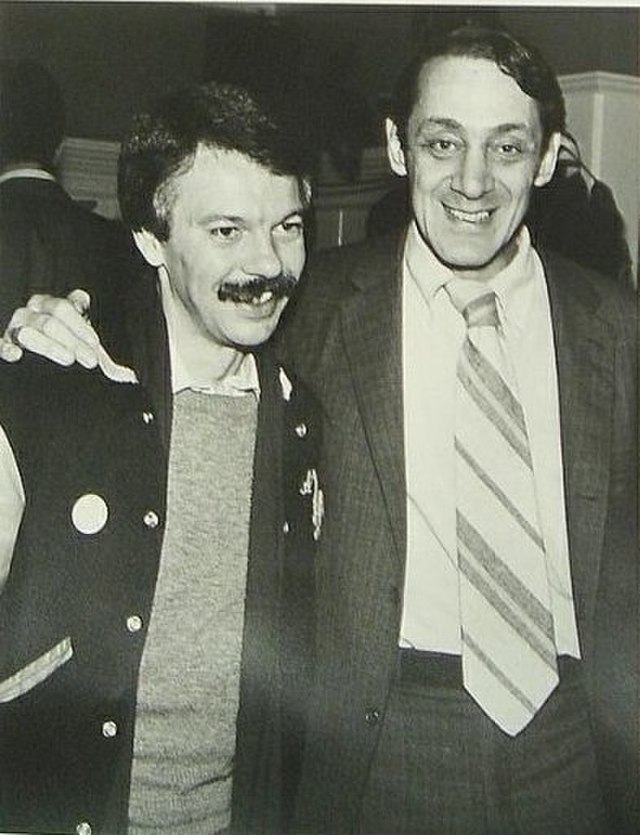
Harvey Milk is pictured on the right. Source: Don Amador, Wikimedia Commons
Marsha P. Johnson (1945 – 1992)
Marsha P. (pay it no mind) Johnson (born as Malcom Michaels Jr.) was a self-identified drag queen (she also identified as gay and as a transvestite, a term we no longer use) and a gay liberation activist. She played a prominent role in the Stonewall Riots and was one of the founding members of the Gay Liberation Front. She also co-founded the Street Transvestite Action Revolutionaries (STAR), a place of refuge for homeless LGBT youth and sex workers.
Marsha was also an HIV/AIDS activist and dedicated much of her time to those infected with the virus. Marsha grew up and lived during a time when anti-gay sentiment was at an all-time high – and the police were involved in hate crimes, too. In 1992, Marsha was found dead at the age of 46 in the Hudson River under mysterious circumstances. The police claimed it was a suicide, but family, friends, and allies all say this was highly unlikely, especially given the anti-gay attitude at the time.
For more information on Marsha’s remarkable and tragic story, you can watch ‘The Death and Life of Marsha P. Johnson’ on Netflix. There is also a children’s book called Sylvia and Marsha Start a Revolution! by Joy Michael Ellison (and no, children are never too young to learn about history!).
‘To me, Marsha was the Rosa Parks of the LGBT movement.’ – Victoria Cruz, Crime Victim Advocate
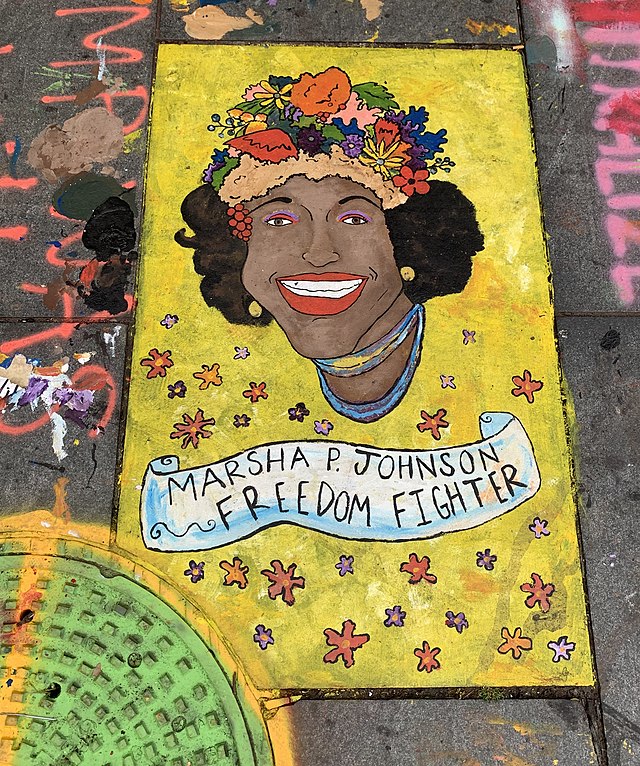
A portrait of LGBTQ activist Marsha P. Johnson. Source: Andrew Ratto, Wikimedia Commons
Sylvia Rivera (1951 – 2002)
Sylvia, who identified as a drag queen, and Marsha P. Johnson were good friends, and they founded the Street Transvestite Action Revolutionaries (STAR) together. Sylvia, like Marsha, was a gay liberation and transgender rights activist in the US.
Sylvia began living on the streets from a very early age (her grandmother disapproved of her so-called effeminate behaviour) and was tragically forced into child prostitution. Sylvia was a staunch fighter for the recognition of drag queens, especially within the gay community. One of the things Sylvia is most famous for is her Gay Power! speech at the 1973 Christopher Street Liberation Day Parade (you can find a video of this on YouTube or watch the ‘The Death and Life of Marsha P. Johnson’). Later in life, Sylvia advocated for the homeless gay community as she was homeless herself.
Here is an excerpt of Sylvia’s Gay Power! speech:
‘You all better quiet down! I’ve been trying to get up here all day for your gay brothers and your gay sisters in jail that write me every … week and ask for your help, and you all don’t do a … thing for them. … They write to STAR because we’re trying to do something for them … I have been beaten. I have had my nose broken. I have been thrown in jail. I have lost my job. I have lost my apartment for gay liberation, and you all treat me this way? … I believe in the Gay Power. I believe in us getting our rights, or else I would not be out there fighting for our rights.’
And here’s an excerpt of Sylvia’s interview in ‘The Death and Life of Marsha P. Johnson’:
‘When I met Marsha, I must’ve been about 12 years old. She was like a mother to me. Marsha was an icon of the gay movement … Marsha and I, we were the liberators. And the street people and the drag queens were the vanguard of the movement.’ – Sylvia Rivera on Marsha.
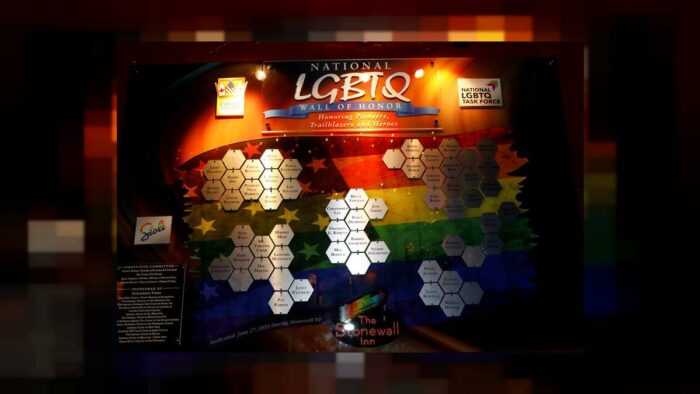
Both Marsha and Sylvia are honourees of the National LGBTQ Wall of Honor in New York City. Source: Shannon Stapleton, REUTERS
Stormé DeLarverie (1920 – 2014)
According to DeLarverie and many eyewitnesses that night, it is widely acknowledged that DeLarverie’s altercation with police set the match that lit the Stonewall Riots in June 1969. Like Marsha, she is also considered the Rosa Parks of the gay community. According to DeLarverie, the term ‘riots’ is the wrong term for what happened at Stonewall:
‘It was a rebellion, it was an uprising, it was a civil rights disobedience – it wasn’t no damn riot.’
DeLarverie performed as a drag king and had a unique drag style, and she served as an inspiration to other lesbians, effectively saying that it was OK for women to wear men’s clothing as everyday wear. DeLarverie was also a volunteer patrol worker in downtown Manhattan, always on the lookout for any bullying, intolerance, and discrimination.
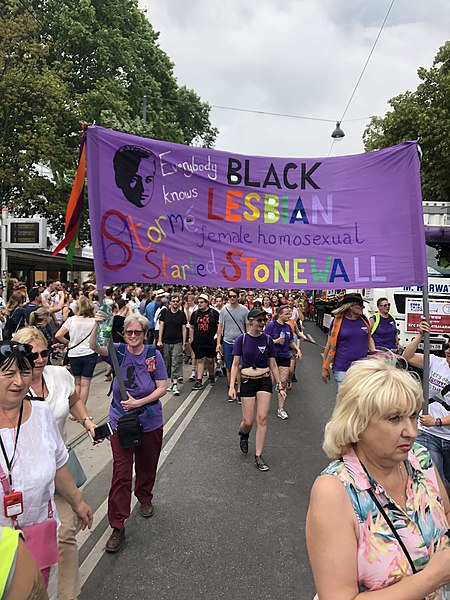
LGBTQ+ allies hoist a banner in honour of Stormé DeLarverie at the Europride Parade in Vienna, Austria. Source: Josie Fraser, CC BY-SA 4.0
Alan Turing (1912 – 1954)
Alan Turing was a significantly influential figure in the world of computing and maths, and he was, quite literally, a code breaker. He played a crucial role in deciphering intercepted coded messages during World War II, which ultimately helped the Allies end the war. Turing’s achievements are endless, and he was undoubtedly a certified genius (seriously, just do a quick Google search of him to see how brilliant he was).
Tragically, Turing died as a criminal – his only ‘crime’ being that he was prosecuted for homosexual acts in Britain in 1952. Instead of going to prison, Turing (horrifically) underwent chemical castration.
In 2009, then-Prime Minister of the UK Gordon Brown apologised for how Turing was treated. In 2013, the Queen officially pardoned Turing for his criminal conviction.
Here’s a short video clip of the UK government’s apology to and recognition of Alan Turing:
You can watch The Imitation Game to learn more about Turing’s legacy. You can also read up on ‘Turing’s Law’. And cool fact: Turing features on the £50 banknote!
Gilbert Baker (1951 – 2017)
Have you ever wondered where the LGBTQ+ flag comes from? Well, here’s your answer! Gilbert Baker is the creator of the famous Rainbow Flag.
‘Flags are torn from the soul of the people.’ – Gilbert Baker
But apart from being a flag-maker, Baker was also a renowned political activist and designer. Having encountered alienation and homophobia during his younger years, Baker found a home in the open and welcoming San Francisco and much later in New York City.
At the beginning of Trump’s presidency in 2016, Baker created ’a collection of Holocaust outfits emblazoned with pink triangles, the symbol that identified homosexuals in Nazi concentration camps.’ This was displayed at the Art Saves Lives Gallery.
Today there is the Gilbert Baker Foundation. Its mission, among others, is to educate future generations about the Rainbow Flag and to record and promote its impact on the world.
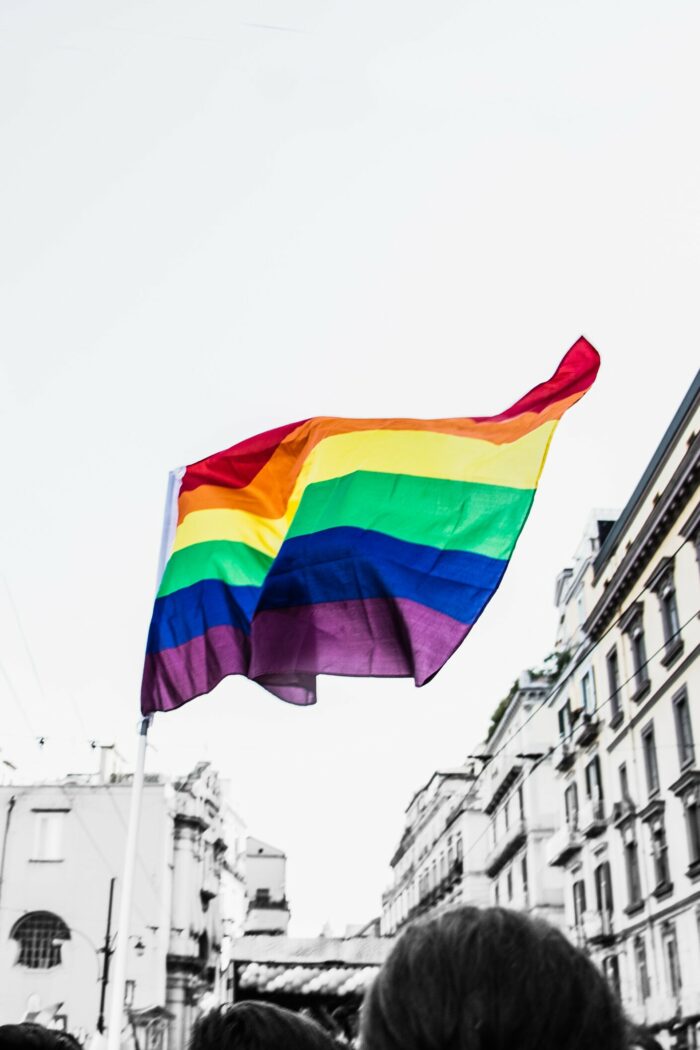
Gilbert Baker is the creator of the iconic Rainbow Flag. Source: Sara Rampazzo, Unsplash
Barbara Gittings (1932 – 2007)
Regarded as the mother of the LGBT rights movement, Gittings was one of the earlier gay activists. In 1958, she, along with Marion Glass, began the New York chapter of the Daughters of Bilitis, the first US lesbian civil rights organisation. She played a significant role in getting activists together for some of the first public demonstrations (known as the Annual Reminders) for gay and lesbian rights. Because of her passion for literature, she was the editor of The Ladder, the Daughters of Billitus’s magazine. Gittings used the magazine in a more militant and political style, writing about protests and the belief at the time that homosexuality was ‘something to be cured’.
Gittings was also pivotal in getting the American Psychiatric Association to remove homosexuality as a mental disorder from its Diagnostic and Statistical Manual. She also fought against discrimination in America’s libraries and fervently promoted gay literature and the increase of gay representation in libraries and literature.
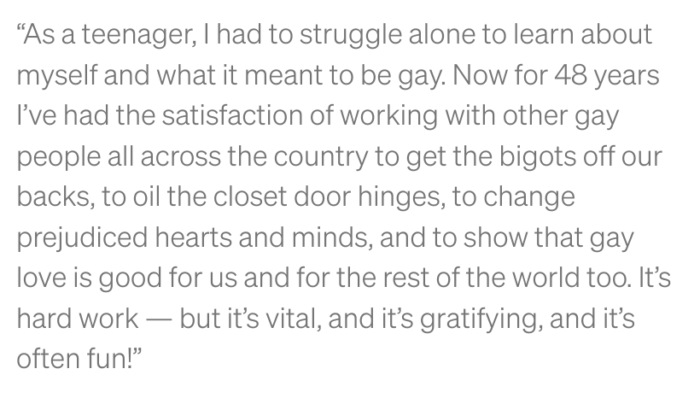
Words from Barbara Gittings. Source: Medium
Simon Nkoli (1957 – 1998)
You’ll notice that all the activists I’ve mentioned above are either from the US or UK (or the dominant West). That’s why it’s also crucial to mention pioneers and revolutionaries from other countries.
Simon Nkoli was a gay rights, HIV/AIDS, and anti-apartheid activist in South Africa. He was part of the Gay Association of South Africa, which was predominantly white at the time and made him and fellow black members feel discriminated against and isolated. Because of this, he founded the Saturday Group, which became the first black gay group in Africa.
Nkoli was later arrested for treason but continued to advocate for gay rights while in prison. After his release, he started the Gay and Lesbian Organisation of the Witwatersrand, which came to organise South Africa’s very first Pride Parade in 1990.
Nkoli actively worked on anti-gay legislation, especially for South Africa’s new Bill of Rights, as well as the dismantling of the sodomy law. He also created the Positive African Men support group for HIV-positive men.
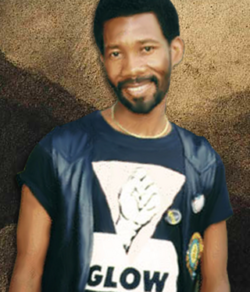
A photo of South African gay rights activist, Simon Nkoli. Source: Braxton University CC BY 3.0
Ifti Nasim (1946 – 2011)
Ifti Nasim was a gay poet from Pakistan. He fled to America to escape persecution for being gay. His book of Urdu poetry titled Narman is considered to be the first expression of gay desire in the language. Narman addresses issues related to Islam’s stance on homosexuality, and unsurprisingly, the publication was met with fierce backlash. It, therefore, had to be distributed underground, but it managed to encourage younger Pakistani poets to be more open and honest in their writing. This new genre became known as ‘Narmani Poetry’.
Once in America, Nasim founded Sangat, an organisation for LGBT South-Asian youths. He was inducted into the Chicago Hall of Fame in 1996.
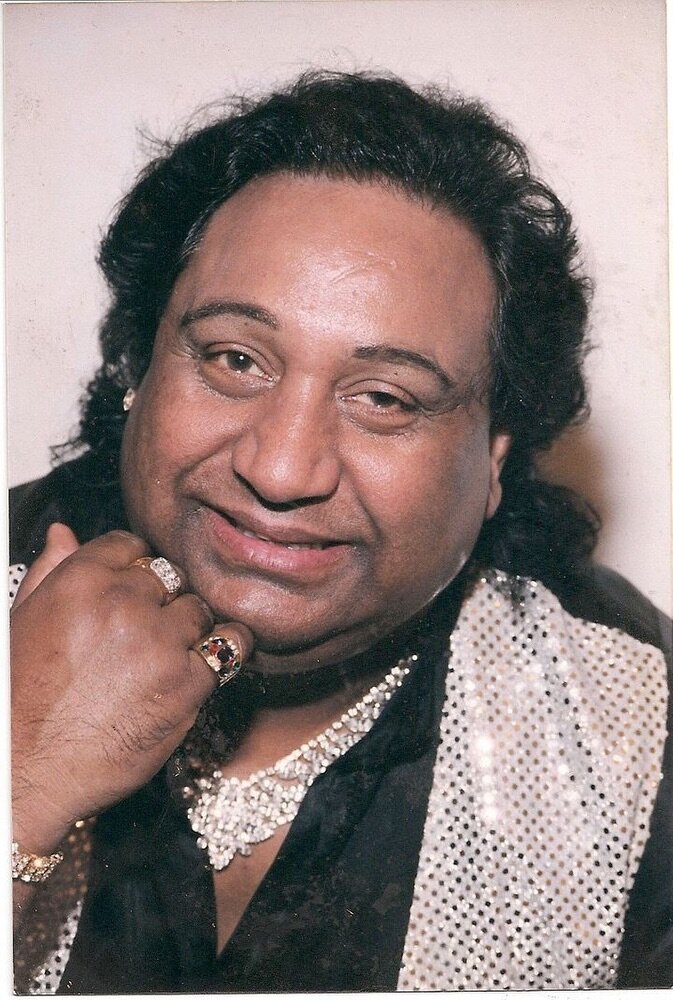
A photo of Pakistani poet and gay activist, Ifti Nasim. Source: Making Queer History
Harvey Milk, Marsha P. Johnson, Sylvia Rivera, Stormé DeLarverie, Gilbert Baker, and Barbara Gittings are all honourees of the National LGBTQ Wall of Honor in New York City. Other honorees include James Baldwin, Christine Jorgensen, Kiyoshi Kuromiya, Phyllis Lyon, and Bayard Rustin.
Fighting the Good Fight: Famous LGBTQ Celebrities
OK, there are A LOT of famous LGBTQ+ celebrities, including celebrities who are allies. Once again, we can’t list everyone, so we’re mentioning those celebrities who made (and make) significant changes and contributions to the LGBTQ+ movement. The celebrities listed here include actors, singers, musicians, entertainers, and sports stars.
Elliot Page
In December 2020, Elliot Page (born Ellen Page) made headlines when he came out as transgender. Known for his roles in Juno and The Umbrella Academy, the oscar-nominated actor has become ‘the most famous trans man on the planet’. Of course, this was met with a lot of hate, bigotry, religious self-righteousness, and discrimination, but as Page says,
‘I love that I am trans. And I love that I am queer. And the more I hold myself close and fully embrace who I am, the more I dream, the more my heart grows and the more I thrive. To all the trans people who deal with harassment, self-loathing, abuse and the threat of violence every day: I see you, I love you and I will do everything I can to change this world for the better.’
Page’s Instagram page is full of trans activism, and he often calls on his followers to help out and be trans allies. In this brilliant article from Esquire, Page talks about his childhood (and how he was bullied), his career, his life, and his transition. I read it, and this stood out for me:
“The reaction to my transition? I didn’t expect it to be so big. In terms of the actual quality of the response, it was what I expected: love and support from many people and hatred and cruelty and vitriol from so many others. I came out as gay in 2014, and it’s different. Transphobia is just so, so, so extreme. The hatred and the cruelty is so much more incessant.”
Below is an example of the type of activism you can find on Page’s Instagram. Also, go and leave some positivity in the comments section because some comments there are really awful. We need to do better!
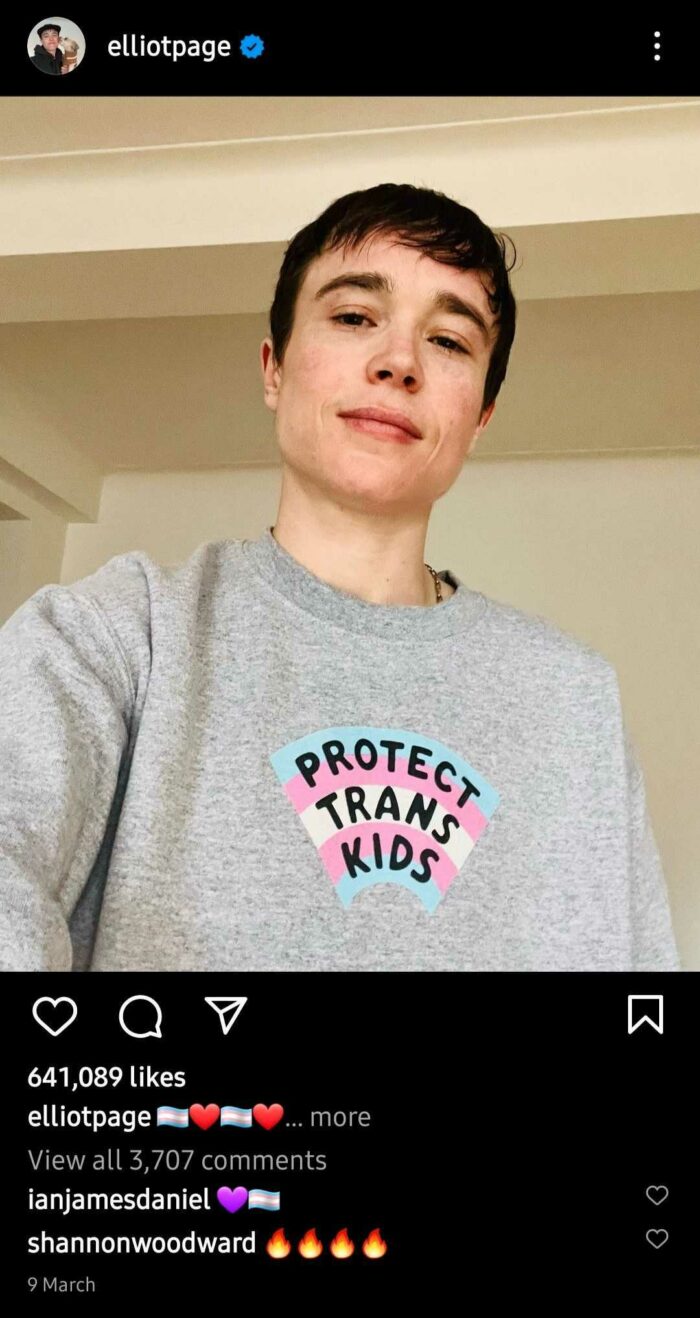
A screenshot from Elliot Page’s Instagram showing his advocacy for trans rights.
Sam Smith
I’m pretty sure you know who Sam Smith is, but maybe you didn’t know that they identify as genderqueer and non-binary, identifying themselves with the pronouns they/them. In a post on their Instagram, Smith wrote:
‘After a lifetime of being at war with my gender, I’ve decided to embrace myself for who I am, inside and out.’
And in another interview, this is what Smith had to say about identifying as non-binary:
‘In changing my pronouns, I felt incredible freedom. It’s like a brick was lifted off my chest, and with that freedom comes another kind of pain … Feeling this free in our skin is answered with abuse. And that’s really hard. For the last year and a half, I’ve thought about changing my pronouns. I’ve always hid behind my “he, him” pronouns because I was too scared. I thought living a life playing pretend would be less painful than being authentic. But I’d rather be myself, even if it means being abused for it. I’d rather get all this sh** for being myself than lie to myself. That’s not a way to live.’
In 2021, Smith criticised the Brit Awards for not having gender-neutral categories (this meant that they weren’t eligible for an award in either category). It is thanks to people like Smith who make using gender-neutral pronouns and terms more visible and, ultimately, more acceptable (don’t even get me started on how people call using plural pronouns for a singular human ‘grammatically incorrect’ – language evolves, people!). And how cool is this: in 2019, the Merriam-Webster dictionary voted ‘they’ as word of the year!
Smith is definitely an LGBTQ+ trailblazer, and you can learn more about them and their LGBTQ+ journey here.
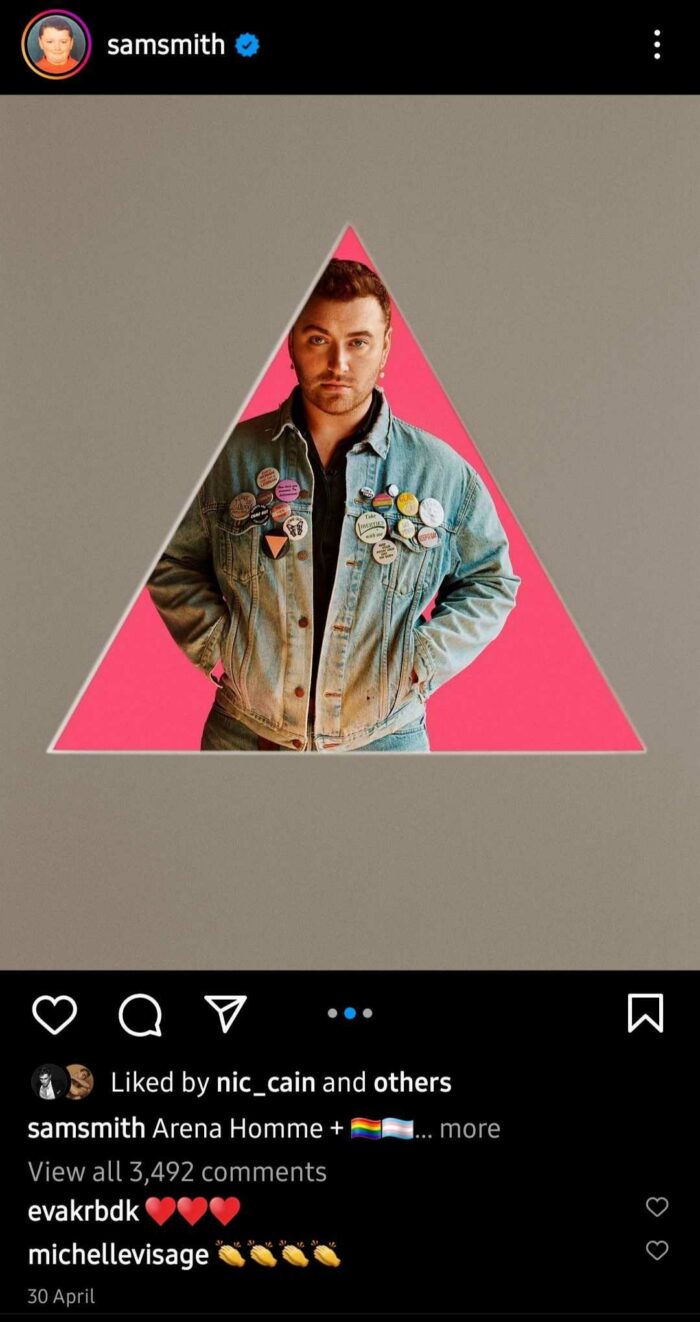
A screenshot from Sam Smith’s Instagram advocating for the LGBTQ+ community.
Freddie Mercury (1946 – 1991)
There’s no way anyone will ever forget this legend – and what I LOVE about watching old Queen and Freddie videos on YouTube is the love they have for him and the band. I’ve seen tons of comments praising Freddie, talking about how there will never be a performer like him. There’s no hate. No slurs because he was gay. It’s like everyone just sees him as a brilliant, talented human who changed the music industry – now WHY can’t we do that for other LGBTQ+ individuals like Elliot Page?
Anyways, in case you don’t know who he is (I mean he was at the height of his fame over 30 years ago!), Freddie was a singer-songwriter and the lead singer for the renowned band, Queen. It’s not 100% clear whether Mercury was bisexual, but he was in a romantic relationship with Jim Hutton up until his premature death from an AIDS-related illness.
Freddie was flamboyant and had an electric persona, and you can find out more about his life and story in the award-winning Bohemian Rhapsody. And fun fact: Queen is still touring today with American Idol runner-up, Adam Lambert, who is also an LGBTQ+ and human rights activist.
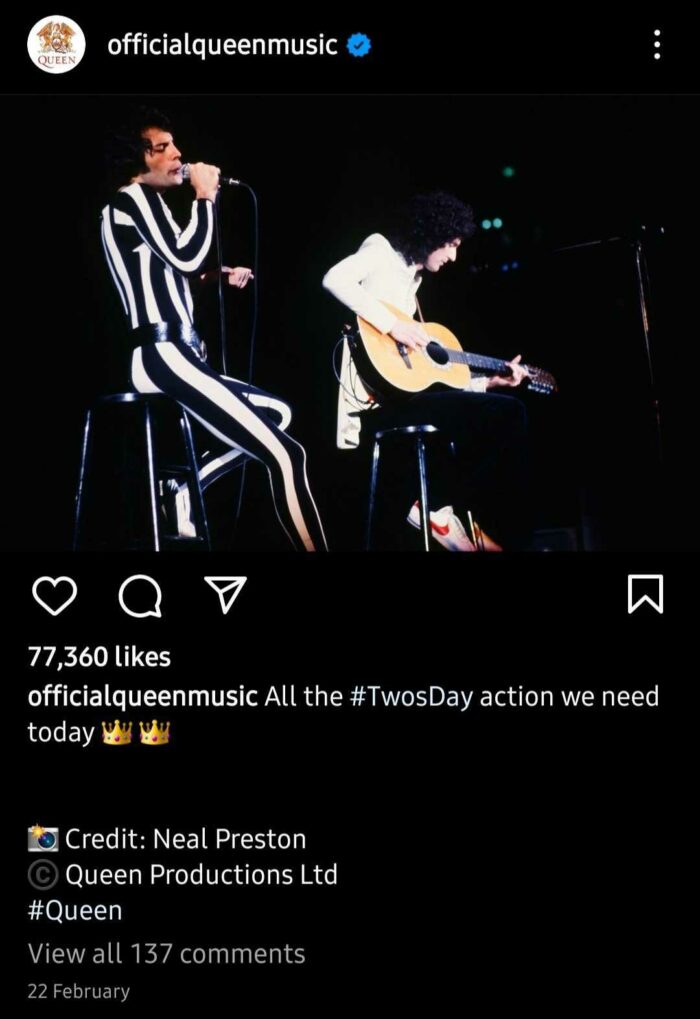
A screenshot from the band Queen’s Instagram. Freddie Mercury, who passed away in 1991, is pictured singing.
Laverne Cox
I absolutely love Laverne Cox! I first discovered her watching Orange Is the New Black (and I highly recommend you watch it – it deals with LGBTQ+ and race issues), but she has been in the entertainment industry for over two decades. Thanks to her role in Orange is The New Black, Cox became the first transgender person to receive a Primetime Emmy Award nomination for acting.
Cox says she grew up feminine and was bullied for it. She also began to think that she was a degenerate and a sinner for liking other boys – she even tried committing suicide when she was only in sixth grade.
Cox is a fervent advocate for the transgender community and was awarded the Stephen F. Kolzak Award for her work as an advocate by GLAAD. And fun fact: Cox is the first openly transgender person with a wax figure of herself at Madame Tussauds!
I would also recommend reading TIME Magazine’s interview with Laverne Cox. You can also take a look at what Cox has to say on the following trans issue:
‘What is your response to people who have fought against trans-friendly laws and bills, like the new California law?
It’s scary to me. There’s a lot of fear mongering. I try to see their side of the story. They think that there are these people who were assigned this at birth, who are going to be infiltrating these spaces and, basically, our girls are going to be unsafe. It’s a thing that stigmatises trans identities … These opponents don’t really understand who we are. They don’t really understand who trans people are when they’re opposing these bills. Sometimes we’re used as scapegoats too, to get other unfortunate agendas passed. That’s the cutthroat thing that’s going on. Some folks, they just don’t understand. And they need to get to know us as human beings. Others are just going to be opposed to us forever. But I do believe in the humanity of people and in people’s capacity to love and to change. God help me for that.’
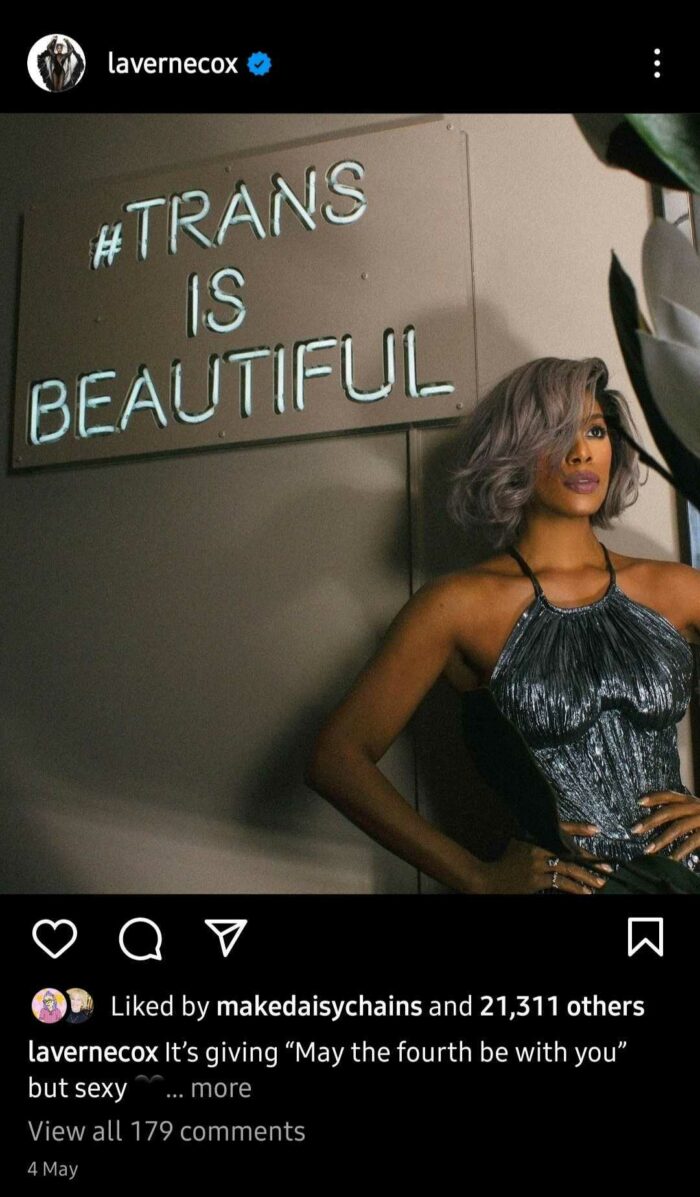
A screenshot from Laverne Cox’s Instagram advocating for the trans community.
Lil Nas X
Lil Nas X sent Twitter into an absolute frenzy when he released ‘MONTERO (Call Me By Your Name)’. While many celebrated the video for its expression of queerness, many Christian and conservative figures called it sacrilegious and devil worship (?). I had a good laugh on Twitter because people were genuinely up in arms about the music video (if only we could be more up in arms about real issues, eh?).
If you haven’t been living under a rock, you’ll know of Lil Nas X’s hit, ‘Old Town Road’. While his song was at number one on the Hot 100, Lil Nas X came out as gay. And cool fact: He is the first openly gay LGBT Black artist to win a CMA award.
Lil Nas X struggled to come out to himself initially but accepted it in his later teen years. In his song ‘Sun Goes Down’, he details how he was bullied and how he grappled with coming to terms with his sexuality.
RuPaul
RuPaul’s Drag Race – need I say more?! RuPaul, a drag queen himself, is one of TIME Magazine’s most influential people, and he has won numerous awards throughout his illustrious career. He is an absolute trailblazer in the LGBTQ+ community and has advocated for equality his whole career. In fact, his show RuPaul’s Drag Race has been instrumental in putting drag more permanently on the map (just think back to the times when Rivera and Johnson had to fight to be seen) and redefining what masculinity means. RuPaul has been actively gay for decades, and he was the first openly gay television host back in 1996.
And how cool is this: RuPaul is the one who came up with the phrase, ‘You’re born naked and the rest is drag.’ Enough said!
The winner of RuPaul’s Drag Race season five, Jinkx Monsoon, says that RuPaul’s show humanises drag queens and shows viewers that ‘Underneath all of it, there’s still a person, a multifaceted, multidimensional person.’
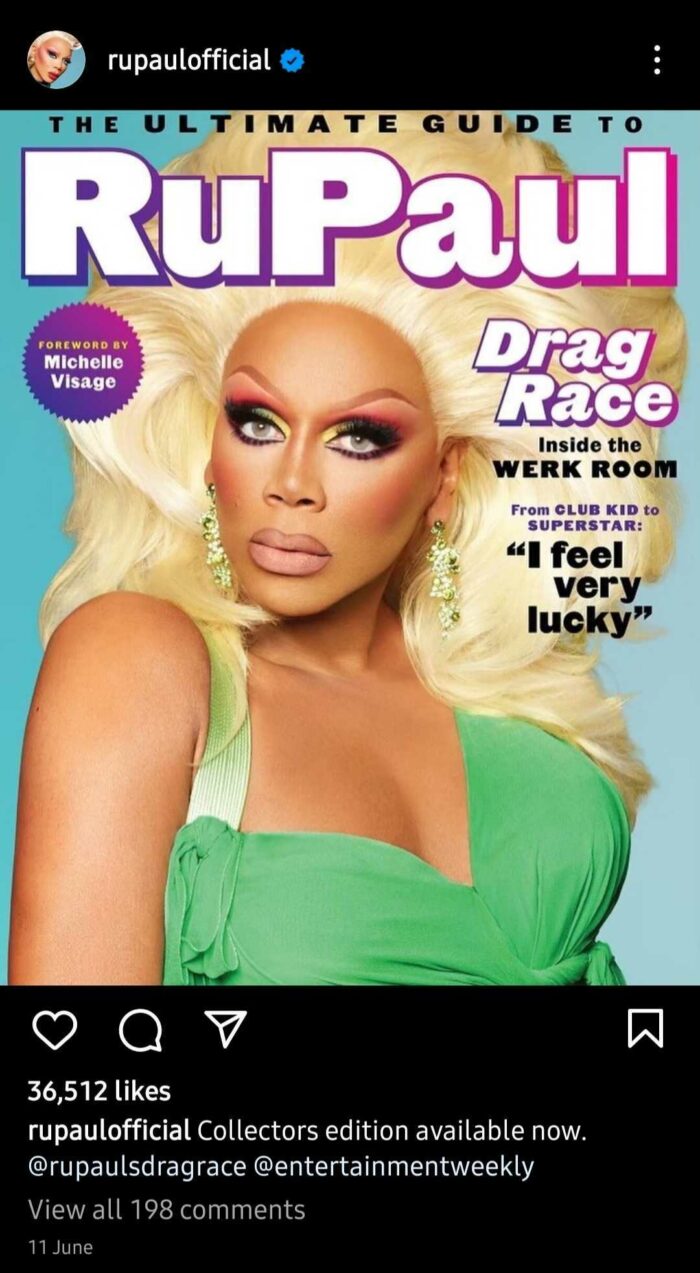
A screenshot from RuPaul’s Instagram advertising his famous show, RuPaul’s Drag Race.
Ellen DeGeneres
Whether you love her or hate her (especially after the allegations that she treated her staff badly on her long-running show), DeGeneres has been instrumental in the representation of and activism for the LGBTQ+ community.
She came out publicly in 1997 (when society was nowhere near as accepting as it is today), which initially had a negative impact on her career (but look at her now!). She is widely considered the celebrity who ‘did more to influence Americans’ attitudes about gay rights than any other celebrity or public figure.’
Below you can watch Ellen reflecting on her coming out moment:
Billie Jean King
Billie Jean King is a famous tennis player, and she has an impressive 39 Grand Slam titles to her name! She was one of the first well-known professional athletes to come out (at the beginning of the 1980s), but she did hide her sexual orientation for a long time. In an interview, King says her parents were homophobic, and she was told by those around her that she would damage her sports career if she came out. It was only at the age of 51 that she could have a proper conversation with her parents about being lesbian.
King has been a fierce contender in the push for gender quality in sports and has campaigned for men and women to have equal prize money. Her Twitter account is super informative, and her activism is evident. You should give her a follow!
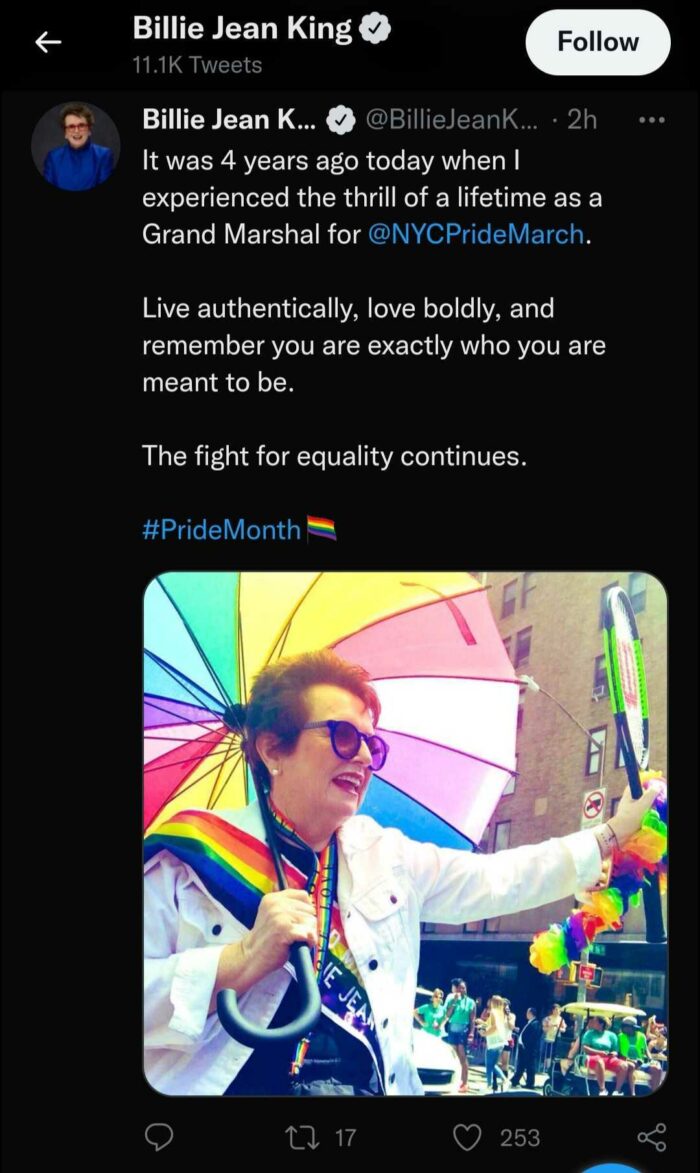
A post on Billie Jean King’s Twitter account advocating for LGBTQ+ equality.
Michael Sam
Michael Sam became the very first openly gay active player to be drafted in the NFL, which wasn’t (and still isn’t easy) in a major sport like American football. In one appearance at an awards ceremony, anti-gay activists were present and protested his appearance. He is a recipient of the Arthur Ashe Courage Award, an award recognising the contributions of people who go above and beyond sports.
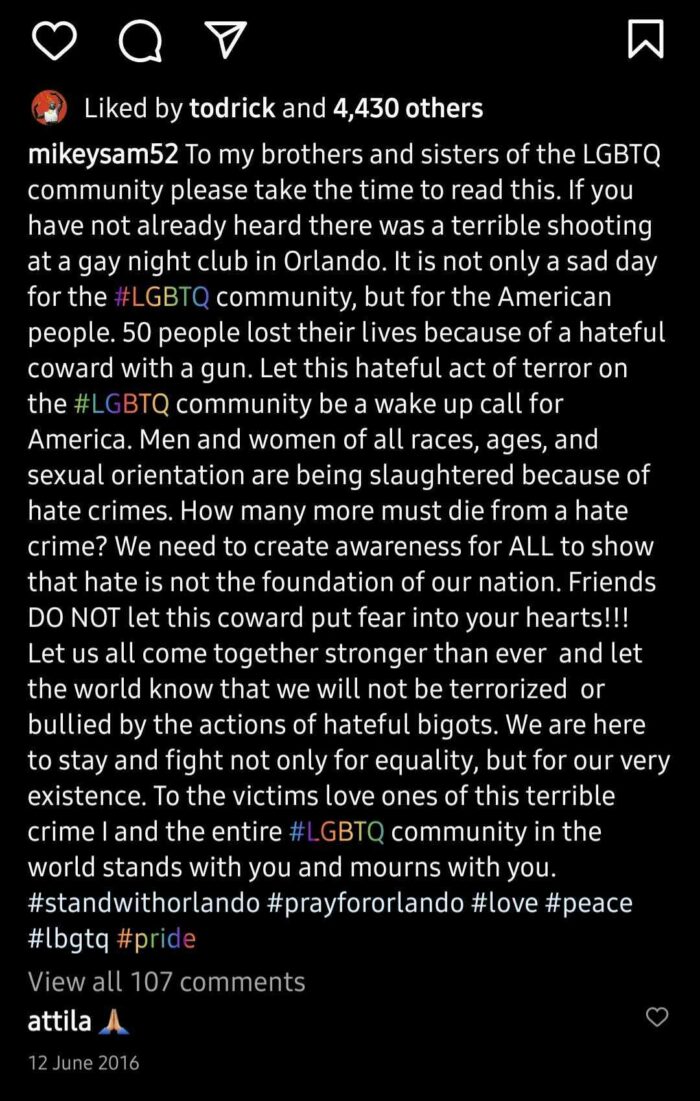
A screenshot from Michael Sam’s Instagram. The post talks about the deadly shooting at an LGBTQ+ nightclub in Florida, US, a few years ago. The shooting was a hate crime.
Carl Nassib
There is definitely a stigma surrounding football (and other sports considered ‘manly’ (whatever that means) – the NFL has been in existence for over a century, and in that time, less than 20 players have come out publicly as either gay or bisexual.
On 21 June 2021, Nassib came out in an Instagram video post. Here’s some of what he had to say:
‘Just want to take a quick moment to say that I’m gay. I’ve been meaning to do this for a while now, but I finally feel comfortable enough to get it off my chest. I just think that representation and visibility is so important … I actually hope that … one day videos like this and the whole coming out process are just not necessary.’
In his coming out post, Nassib also said he was donating to the Trevor Project, an organisation dedicated to providing life-saving resources to the LGBTQ+ community.
Nassib’s announcement came with tons of support, but of course, there were still the usual trolls and people spouting hate. This is why top sportspeople coming out – especially in sports like football – is a huge leap forward for the LGBTQ+ community!
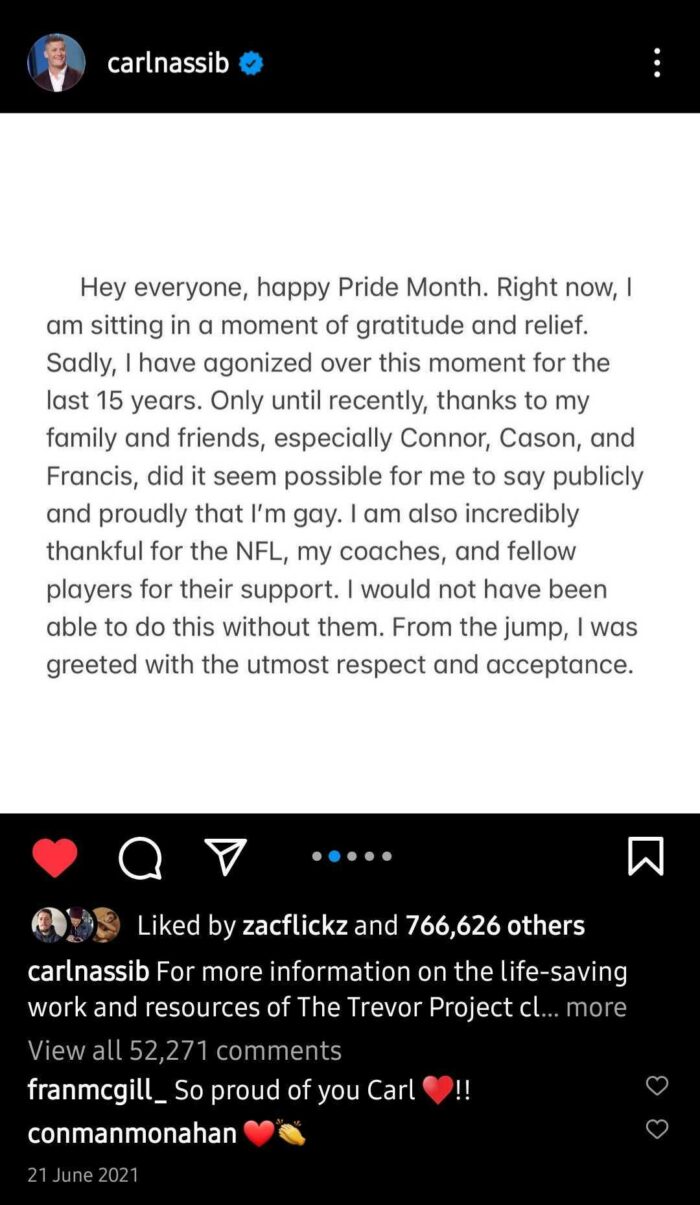
A screenshot from Carl Nassib’s Instagram. This was his coming-out post in June 2021.
Caster Semenya
Mokgadi Caster Semenya is a South African athlete and a two-time Olympic gold medallist. Semenya is an intersex woman – she was assigned the sex female at birth and has internal testes, which elevates her testosterone levels. As a result, there has been controversy surrounding Semenya’s participation in female athletic events. She was forced to undergo sex testing, and in 2019, she was officially banned from participating in certain events in the female category – unless she takes medication to reduce her testosterone levels (?).
You can read more about Semenya’s struggles to participate in athletics as a female here.
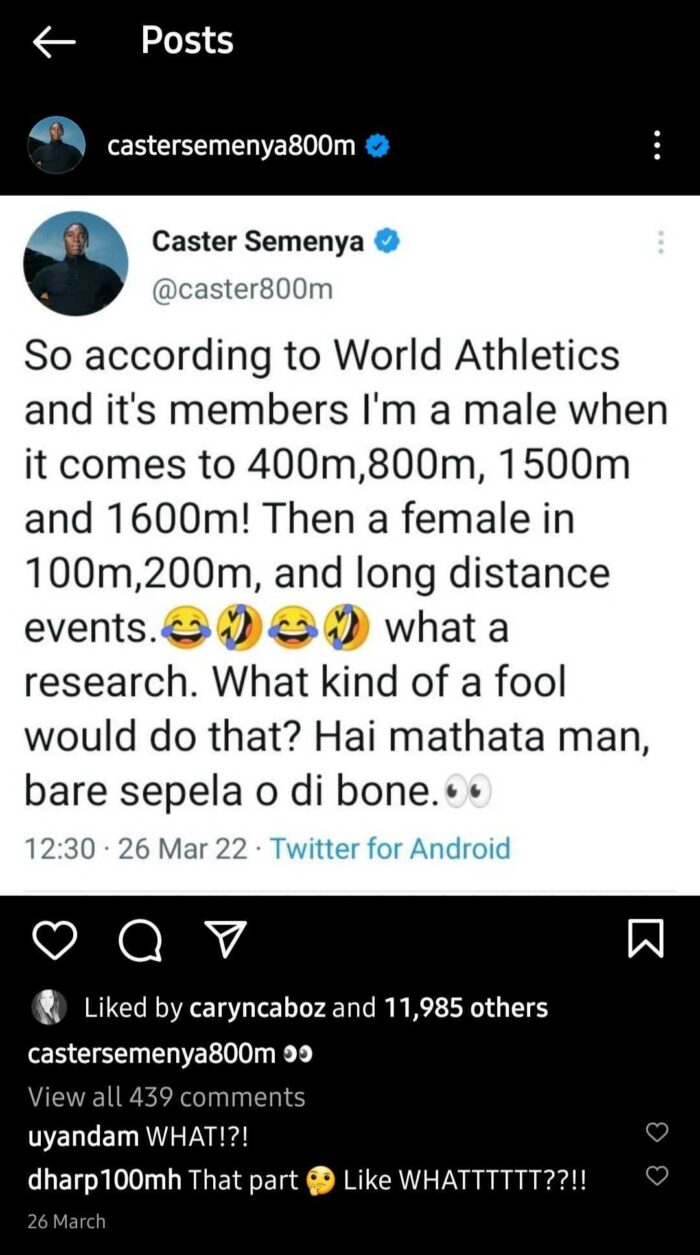
A screenshot of Caster Semenya’s Instagram. Here, Semenya reposted her Tweet detailing what she has to face as an intersex athlete.
Other influential LGBTQ+ celebrities and icons you can look up include George Michael, Tracy Chapman, Elton John, Sir Ian McKellen, Neil Patrick Harris, Wanda Sykes, Jodie Foster, Jesse Tyler Ferguson, Sean Hayes, Tommy Dorfman, Hayley Kiyoko, and Betty Who.
The Power of Art: Famous Gay Artists
What would the world be without art and literature? One of my favourite quotes of all time is from Robin Williams’ character, Mr Keating, in Dead Poets’ Society: ‘Medicine, law, business, engineering, these are noble pursuits and necessary to sustain life. But poetry, beauty, romance, love, these are what we stay alive for.’
Undoubtedly, art, literature, poetry, and films (you name it) can help us in the most profound ways – from finding comfort and solace in a fictional world to identifying with certain characters, literature and art can support us tremendously as we try to navigate the difficulties of life. That’s why for many members of the LGBTQ+ community, JK Rowling’s stance on transgenderism was incredibly disappointing and hurtful.
Below we look at a few artists and authors whose life and work were influential for the LGBTQ+ community (and don’t worry, JK Rowling definitely isn’t on this list).
Oscar Wilde (1854 – 1900)
I’m loathed to admit that even though I have my MA in English Literature, I’ve never actually read anything by Oscar Wilde (I guess it’s time to do so?!). Wild was a poet and playwright and is largely known for his novel The Picture of Dorian Gray. Wilde was accused of being homosexual, and he was later arrested and put on trial for what was then known as ‘gross indecency’.
Virginia Woolf (1882 – 1941)
OK, OK – I actually haven’t read any of Woolf’s work, either, but I do have one of her novels on my shelf waiting for me! If you don’t know by now, Woolf was an influential modernist author, known for her use of the stream of consciousness as a narrative device. Woolf was known to have affairs with women, and you’ll find lesbian and feminist themes throughout her work. However, Woolf and her work are not without controversy, and she has been branded as racist and antisemitic.
David Hockney
David Hockney is one of the most influential artists of the twentieth century and was one of the leading figures of the pop art movement. Hockney came out as gay at a young age, just before Britain decriminalised homosexuality. Some of his major works explore gay love (you can look up ‘We Two Boys Together Clinging’ and ‘Domestic Scene, Los Angeles’). The David Hockney Foundation was founded in 2008 to ‘advance appreciation and understanding of visual art and culture through … David Hockney’s work.’
Andy Warhol (1928 – 1987)
If you haven’t heard of Andy Warhol, then I’m not sure where you’ve been! Warhol was a pioneer in pop art, and he was a pretty controversial figure, too. He was openly gay at a time before the gay liberation movement, and much of his art was influenced by his sexuality. Some of his initial works were rejected for being ‘too gay’.
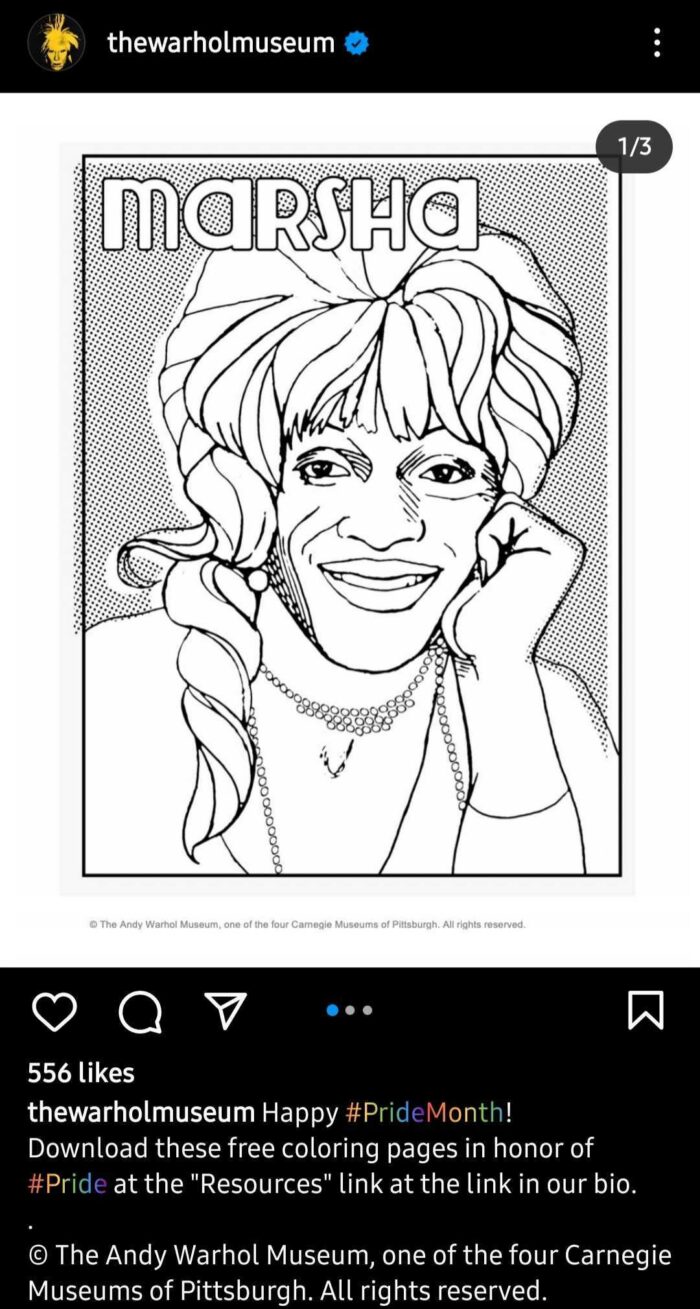
To celebrate Pride Month, the Warhol Museum has free downloadable colouring pages! Here’s one of Marsha P. Johnson. If you enjoy colouring and being artistic, go and do this!
Paul Cadmus (1904 – 1999)
Cadmus is considered a pioneer of Queer Art. He was openly gay and advocated for equality, tolerance, and sexual freedom through his artwork. Some of his most famous works include ‘The Fleet’s In’ (which has a queer subtext), ‘Coney Island’, ‘Venus and Adonis’ (also with queer subtext), and ‘What I Believe’, which is a tribute to E.M. Forster, a closeted gay British author.
Kate Bornstein
I’d never heard of Kate Bornstein until now, but I’ve just discovered she’s a gender non-conforming trans author. Her work is dedicated to changing the way we think about gender (it’s not simply binary, by the way), and you can check out some of her books:
- Gender Outlaw: On Men, Women and the Rest of Us
- Hello Cruel World: 101 Alternatives to Suicide for Teens, Freaks, and Other Outlaws
LGBTQ Celebrities: Why Celebrities Coming Out Is Cause Célèbre (in a Good Way!)
I really liked what Carl Nassib said in his coming out video: Hopefully, one day, coming out won’t even need to happen because it will be so NORMAL and ACCEPTED. But sadly, we’re still not there, and oftentimes, it does feel like it’s getting a little worse with the hate and discrimination and even legislation in some countries. So, until that day comes when we’ve achieved FULL acceptance, it really is important that we acknowledge and celebrate celebrities who come out because it definitely gives confidence to those who need it and helps with visibility and normalisation.
Look, I’ll be honest, it’s weird to me that people are anti-gay – I mean why are they so preoccupied with who someone chooses to have a romantic/sexual relationship with? Anyways … for us allies, we really need to keep educating ourselves and raising awareness about the issues the LGBTQ+ community faces, especially the trans community.
For now, I suggest that you keep supporting LGBTQ+ celebrities, artists, and writers and actively stand up to hate and discrimination. We also have more posts for Pride Month, including an explanation of LGBT rights in the UK and the history of Pride Month and why we celebrate it.
Love is love! 🏳🌈
Frequently Asked Questions (F.A.Qs)
This is a difficult question to answer because a) there are many LGBTQ+ icons, and b) different people will consider different people as their icons! However, many people consider Judy Garland, Freddie Mercury, Elton John, Prince, David Bowie, George Michael, Madonna, Britney Spears, Cher, Lady Gaga, Katy Perry, RuPaul, and Sam Smith as LGBTQ+ icons.
Some of the most famous LGBTQ+ actors are Sir Ian McKellen, Wanda Sykes, Jodie Foster, Laverne Cox, Elliot Page, Ruby Rose, Kristen Stewart, Sarah Paulson, Neil Patrick Harris, Jim Parsons, Luke Evans, Jesse Tyler Ferguson, Sara Ramirez, and Brandon Flynn.
I don’t think there is any ‘most famous’ LGBTQ+ person, but many will probably think of Ellen DeGeneres (she publicly came out in the 1990s on television) or even Freddie Mercury (lead singer of Queen). Other famous LGBTQ+ celebrities today include RuPaul, Sam Smith, and Elliot Page. Very famous historical figures who fought for LGBTQ+ rights include Barbara Gittings, Marsha P. Johson, Sylvia Rivera, and Harvey Milk.
How we ensure our content is accurate and trustworthy?
At StudySmarter, we have created a learning platform that serves millions of students. Meet the people who work hard to deliver fact based content as well as making sure it is verified.

Gabriel Freitas is an AI Engineer with a solid experience in software development, machine learning algorithms, and generative AI, including large language models’ (LLMs) applications. Graduated in Electrical Engineering at the University of São Paulo, he is currently pursuing an MSc in Computer Engineering at the University of Campinas, specializing in machine learning topics. Gabriel has a strong background in software engineering and has worked on projects involving computer vision, embedded AI, and LLM applications.
Get to know Gabriel